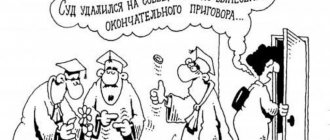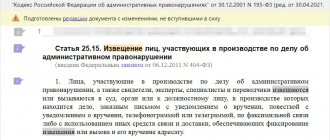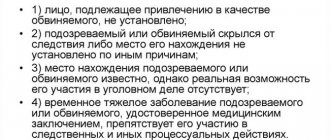To save effort, time and money in the fight against crime, the legislator provides a special procedure for considering a criminal case in court .
This is a special procedure, the approval of which requires the personal consent of the person with the charges brought against him.
The special procedure significantly speeds up the judicial process. However, it also has disadvantages that it is important for the accused to know about before making a decision .
Characteristics of a special procedure for trial
A special procedure in a criminal case is a specific proceeding that is carried out in the court of first instance.
It is characterized by legal relations and activities of participants aimed at establishing a person’s guilt in committing a crime in a shortened judicial investigation.
The leading role in the process is assigned to the magistrate or district court.
Tasks
The main objectives of the special procedure for considering a criminal case in court are:
- simplifying the nature of criminal proceedings in court;
- speeding up the criminal process at the trial stages from the moment the prosecutor brings the case to court;
- reducing the workload on magistrates and district judges.
Since the person fully admits his guilt, the court has the opportunity to impose a reasonable and legal punishment without establishing the specific circumstances of the crime.
This relieves judges, allowing them to focus on considering more complex and voluminous criminal cases that cannot be considered in a special order.
Reasons for use
The conditions under which a special procedure is approved in a criminal case are listed in Part 1 of Art. 314 Code of Criminal Procedure of the Russian Federation . These include:
- consent of the accused, victim and prosecutor to pronounce a sentence without a trial;
- a clear understanding by the accused of the nature of the application of the special procedure and the consequences to which this will lead;
- consideration only of those cases in which the maximum punishment does not exceed 10 years of imprisonment;
- the presence of comprehensive evidence of the legality and validity of the accusation;
- lack of grounds to terminate the case.
The judge must make sure that the evidence collected is sufficient to confirm the citizen's involvement in the crime. If he has doubts, he will not be able to pronounce a guilty verdict even if the defendant pleads guilty.
...So, you are offered to consider the case in a special manner. What do you need to know? Consideration of a case in a special order is possible if the crime carries a punishment of no more than 10 years, if the prosecutor, the victim and the court agree with the “special order”. And, most importantly, if the defendant admits his guilt in full, and in the same interpretation as set out in the indictment. Attention: admitting guilt does not create an obligation for the defendant to recognize the claims of the victim, although this issue is debatable. The case cannot be considered in a “special procedure” if the defendant is a minor.
In short, a special trial procedure is the absence of a trial as such. Witnesses are not questioned, the case materials are not examined, the court proceeds from the proof of the defendant’s guilt, in fact, in connection with the latter’s admission of guilt. According to the template, only case materials characterizing the defendant are examined. After which the parties immediately move on to debate. The verdict becomes a mere formality.
The court sentence cannot exceed 2/3 of the maximum sentence, but the defendant does not have the right to complain to a higher court about the circumstances of the case (since the circumstances are not investigated). The complaint may contain disagreement with the amount of punishment and procedural violations, if any.
Let's figure it out - is this good or bad? Let’s make a reservation right away: the judges like the “special order”, just like the entire prosecution side. This is quite understandable - there is no need to think about the matter. Often sentences in this category of cases are “conditional” in nature.
Is this really beneficial for the defendant? You must clearly understand that under the “special procedure” you will never, I repeat, never be acquitted. You will definitely be found guilty of committing a crime, with all the ensuing consequences. The victim's claims, even if the defendant does not agree with them, will most likely be satisfied in whole or in part. If the defendant receives a “real” sentence, then he will not be able to appeal any “jambs” in the case. All violations committed during the investigation will remain buried in the materials. Since witnesses in court are not questioned and materials are not made public (with the exception of those characterizing the personality of the defendant), the defendant will have nothing to appeal to higher authorities (up to the Supreme Court).
The complaint will be formal in nature and contain a request to reduce the sentence.
Consideration of the case in a “special order” is a risk borne by the defendant. This risk may be justified based solely on the content of the criminal case materials.
Your problems are often frightening in their complexity and intricacy. You should not despair and need to call
+7
Our specialists will analyze your problem and develop ways to resolve it in accordance with your wishes, the real state of affairs, the practical experience of our employees and current legislation.
Good luck and success.
Stages of consideration of a case in a special order
The special procedure for trial is regulated by Art. 316 Code of Criminal Procedure. It includes several stages.
Stage No. 1: Preparation for the court hearing
Before the start of the hearing, the judge is obliged to establish that the accused voluntarily agreed to have his case examined in a special manner, received advice from a professional defense lawyer and was fully aware of the essence, nature and consequences of his decision.
It is not necessary to submit a petition with this request.
If the court, at the preparatory stage, reveals violations of the requirements for filing a petition or determines that the accused or prosecutor opposes the special order, its approval will be denied. In this case, the judicial investigation will proceed as usual.
Stage No. 2: Conducting a court hearing
The legislator does not establish clear rules on the composition of the court, which should conduct proceedings in a special manner.
Therefore, in theory, a situation is possible in which the accused makes two requests at once - for the introduction of a special procedure and for a collegial hearing of the case with the participation of three federal judges.
This is possible, since such a composition, according to clause 3, part 2, art. 31 of the Code of Criminal Procedure of the Russian Federation, has the right to resolve criminal cases of grave and especially grave crimes. However, in practice such situations are extremely rare.
When considering a case in a special manner in accordance with Part 1 of Art. 31 of the Code of Criminal Procedure of the Russian Federation, the court hearing takes place in the mode that is established in the court of first instance.
However, the procedure has its own characteristics:
- Mandatory presence of the accused and his defense attorney or lawyer . The rule described in Part 4 of Art. is excluded. 247 Code of Criminal Procedure of the Russian Federation. It states that proceedings in a case of medium or minor gravity can be carried out without the presence of the accused in the courtroom if he has filed a corresponding request.
- Mandatory participation of a public or private prosecutor . He must speak first, outlining the essence of the charges brought against him.
- Interviewing the defendant and the victim . It is necessary to establish whether they understand the essence of the charges brought, whether they agree with them, and whether they support the previously filed petition to apply a special procedure for considering the case.
- The court's determination of the fact of notification of the victim about the time and place of the hearing is carried out in the event of his absence in the courtroom.
Since there is no judicial investigation, the judge does not evaluate the available evidence. However, the law requires compliance with the general rules for imposing a fair punishment. Therefore, at the initiative of the parties, the evidence is still examined.
In addition, it is possible to study data characterizing the personality of the defendant, mitigating and aggravating circumstances . For this purpose, witnesses are questioned and documents are examined.
The process ends with court arguments and the final word of the accused.
Stage No. 3: The verdict and its appeal
Consideration of the case in a special manner provides for the proclamation of a guilty verdict . On the other hand, in Chap. 40 of the Code of Criminal Procedure of the Russian Federation there are no rules that prohibit making other decisions.
Therefore, in order to pronounce a guilty verdict, the judge must form a firm internal conviction of the defendant’s guilt. It can only be based on consideration of the case materials and evidence, and not on guesswork.
If the court has doubts about the guilt of the defendant , it must make a decision to terminate the consideration of the case in a special manner. A trial will be scheduled according to general rules, during which the collected evidence will be examined.
This is necessary for an acquittal.
The special procedure for considering a criminal case provides for more lenient sanctions : up to 2/3 of the maximum term of imprisonment or the amount of the most severe punishment.
After pronouncing the verdict, the judge explains to the defendant the possibility of appealing it through the appellate or cassation procedure.
In Art. 317 of the Code of Criminal Procedure of the Russian Federation establishes only one restriction . An appeal is impossible due to the discrepancy between the judge’s conclusions contained in the verdict and the actual circumstances of the case, which are established by the court of first instance or appellate instance.
Special procedure in criminal cases
WHAT IS “SPECIAL ORDER”?
When the entire process of collecting evidence confirming the guilt of the alleged criminal comes to an end, the person brought to criminal responsibility often hears from the investigator a question, sometimes in the form of urgent advice: does the accused want to take advantage of the “special procedure”? In practice, this question-wish is sometimes heard even during the first interrogation of a suspect, when the investigator, persuading him to confess, describes the numerous and unconditional advantages of using a “special order”, as a result of which the suspect will receive such a minimal punishment that it will be lower than anything that can draw your wildest imagination.
Few law enforcement officials convey to the person the whole essence of this procedure and all its legal consequences. Meanwhile, in my opinion, it is in the consequences of using the “special order” that all its pros and cons for the defendant, all the problems, pitfalls and pitfalls lie.
So, what is the “special procedure” that any accused person will hear about more than once during the investigation?
“Special procedure” is a specific proceeding for the consideration of criminal cases in courts, consisting of special legal relations and actions of subjects of criminal proceedings with the general and leading role of the presiding judge, which consists of researching and determining the presence or absence of reasons and grounds allowing the conduct of a trial in relation to specific person through a shortened and simpler sentencing procedure.
The procedure for conducting criminal proceedings in a special manner was introduced in 2001 and was determined by the desire of legislators to save effort, time and material resources of law enforcement, investigative and judicial authorities in conditions where the defendant fully agrees with the position of the investigative authorities reflected in the final procedural documents of the preliminary investigation, such , such as an indictment. In order for a criminal case to be considered according to this procedure, certain legal and factual grounds are required, which the judge is actually called upon to establish:
- Category of crime. The defendant pleads guilty to a minor, moderate, or felony crime. Accordingly, the maximum punishment that threatens the defendant should not exceed ten years in prison.
- Full admission of guilt. This means that a person must agree with absolutely all the factual circumstances of the act, the form of guilt and motives for committing the act, the legal assessment of the act (clause, part of the article of the Criminal Code of the Russian Federation), as well as the nature and extent of the harm caused by the act. In other words, the accused unconditionally agrees with the accusation in full, with every word, with every letter!
- Statement by the defendant on the use of this form of trial. Moreover, it must be submitted in writing or reflected in the protocol.
- The moment of decision. An application to consider a case under a special procedure is made only before the start of the case in court. That is, it is necessary to declare a special procedure either when the defense examines the case materials after the completion of the entire investigation, or at a preliminary hearing, if it is mandatory.
- Participation of the defender. The petition must be submitted only in the presence of a lawyer. It is understood that the participation of a professional defense attorney ensures that the person making the application under consideration will be aware of both the essence and all the legal consequences of the application made by him.
- Consent of the prosecution. If the case involves a victim, a prosecutor or a private prosecutor, then they must all agree that the process will take place in a “truncated” format. Moreover, none of them is obliged to in any way motivate their agreement or disagreement with this.
- The validity of the accusation. The accusation must be based on specific facts and circumstances of the case, allowing for a reasoned conclusion about the guilt of the person, and also be supported by a body of evidence.
- There are no grounds for terminating the criminal case.
SPECIAL ORDER: PROS AND CONS
So, let's look at everything that is positive and negative about considering a case under a special procedure.
If we talk about the positive aspects of this institute, then, in my opinion, there are not very many of them.
The most important thing, perhaps, is that in a trial conducted in a special manner, the defendant is guaranteed that the amount of the most severe punishment will be reduced by at least one third. That is, if a person has committed an act for which the maximum that can be imposed on him is 9 years of imprisonment, then the court cannot determine a punishment exceeding 6 years of imprisonment. In addition, there is a real significant saving in the time of consideration of a criminal case. The court does not call or interrogate witnesses, does not examine other evidence (expert reports, protocols, documents, physical evidence, etc.), and certainly does not double-check them. Therefore, if, for example, a person is detained, he avoids numerous grueling transportation in paddy wagons, undergoing inspections in a pre-trial detention center, etc. If a person is at large, then he is not distracted from normal activities, does not take time off from work, and has the opportunity to earn material resources to support his family, pay for lawyers, etc.
If we are talking about the negative aspects of using a special order, then I believe there are many more of them. They are all interconnected, interdependent and flow from one another.
Firstly, as already mentioned, when considering the grounds for using this institution, you will have to agree not only with the qualification of your actions, but also with all the other circumstances of the crime charged to you. That is, the law requires that you agree with virtually every letter of the charge brought against you. In practice, this means that even if the accusation contains, although it does not affect qualifications, circumstances and facts that do not correspond to reality, no matter how absurd they may seem to you, no matter how obvious it is to you that a specific fact is indicated in a distorted form or it did not exist at all and this is entirely a fantasy of the investigation, you will have to agree with him.
The second and, perhaps, the most important point: the defense cannot appeal against the verdict that the court passed in a special manner in terms of challenging the factual circumstances. Thus, having initially agreed with all the facts and circumstances set out by the investigation, you will not be able to appeal the verdict, which “confirms” the plot of the crime, that is, you will not be able to subsequently challenge something that you previously agreed to, you will not be able to prove your innocence in court appellate and cassation instances. The verdict can be appealed only due to procedural violations committed by the court, or due to the injustice of the imposed punishment due to its excessive severity.
In addition, by agreeing with the accusation, you will be forced to agree with the extent of the harm caused by the crime and, therefore, with the civil claim, which is usually filed by the victims in the case. As in the case of circumstances directly related to the commission of a crime, if you disagree with the amount of the civil claim, you will not be able to appeal the verdict in terms of disagreement with the civil claim.
Unfortunately, these provisions of the institution discussed in this article are very often not brought to the attention of suspects and accused. People sometimes learn or delve into all these subtleties only when the verdict passed does not suit them for one reason or another. Naturally, this most often happens when a severe punishment is imposed. At the same time, it very often happens that it is no longer possible to correct the injustice, because the court formally imposed a punishment within the allotted 2/3 of the maximum punishment, and the defendant’s expectations regarding the minimum punishment, or a punishment below the lower limit, remain his expectations.
This does not mean that the possibility of considering a criminal case in a special manner should be ignored. Each case is individual and it would be wrong to give advice for all occasions. Of course, cases were considered in a special order, including with my participation. However, for the above reasons, the selection of a special procedure as a mode for considering a specific criminal case should be treated with particular scrupulousness and caution.
In this regard, I consider it advisable to observe the following rules:
- Do not rely on the words of law enforcement officials regarding the advisability of choosing a special procedure and be guided solely by your own understanding of the situation.
- Do not make a decision ahead of time, especially if we are talking about the first interrogation. Giving evidence and the possibility of applying a special procedure are in no way related concepts. If you provide the investigation with a confession, it is far from a fact that, firstly, the case will be considered in a special manner, and, secondly, you will receive a minimum punishment. This may not happen for many reasons: for example, the victim will object to the “special order”. In addition, from the first interrogation until the moment a special procedure is chosen as a form of legal proceedings, a lot of time will pass, during which the actual circumstances of the crime charged to you, the qualification of the act may change, as a result of which the case simply may not fall into the category of cases, considered in a special manner. The confession will remain at the disposal of the investigation as evidence of your guilt. It can be extremely difficult to challenge them later. On the other hand, the law says that the condition for applying a special procedure is an admission of guilt, not a confession. Therefore, if you generally refuse to testify at the first or subsequent interrogations, this will in no way prevent you from choosing a special procedure subsequently.
- It is necessary to consider the advisability of choosing a special procedure only after the final charge has been presented at the final stage of the investigation.
- If you really fully agree with every letter of the accusation, which is formulated in the final procedural documents, you should make a decision after receiving reliable information about the evidentiary material collected in the case that confirms your guilt. This happens after familiarization with the materials of the criminal case and their careful analysis for their reliability and sufficiency.
- The final decision should be made solely after consultation with a lawyer who has no relationship with the investigator and whom you completely trust. A lawyer will help you understand and analyze all the procedural aspects of using a special procedure, explain its pros and cons as applicable to your specific case, and give advice on the amount of the imposed penalty that you will face, both in the case of using a “special procedure” and in the event that you the usual order will be followed.
- Share on facebook
Added02/04/2016 | Articles that will help you, Criminal cases
Agreement on cooperation (pre-trial)
The defense and prosecution parties may enter into a special cooperation agreement . It agrees on the conditions of liability of the accused (suspect) when he commits certain actions from the moment a criminal case is initiated or charges are brought.
The Criminal Procedure Law imposes the following requirements for filing a motion to enter into an agreement:
- filing a petition by the accused (suspect) in writing with the signature of a defense attorney or lawyer;
- application within a certain period - from the start of criminal prosecution to the completion of the preliminary investigation;
- the presence in the petition of information about what actions the accused (suspect) undertakes to perform to facilitate the investigation, reveal the identities of accomplices, and search for missing property.
The prosecutor must consider the petition within three days and make a decision to satisfy it or refuse to satisfy it.
If a positive decision is made, then after the end of the preliminary investigation, the prosecutor issues a resolution confirming that the accused has fulfilled his obligations.
This document, together with the criminal case, is then sent to the court, where the issue of approving a special procedure for trial is decided.
Article 292 of the Code of Criminal Procedure of the Russian Federation. Contents and order of debate between the parties (current edition)
1. Judicial debates represent a stage of judicial proceedings at which the parties involved in the case, in oral presentations, express their position on the case, based on the results of the judicial investigation.
2. The defendant has the right to participate in judicial debates only on the condition that he refuses to have a defense attorney participate in the case. If the defense attorney is absent for other reasons (failed to appear at the court hearing, suddenly fell ill, etc.), the court must take measures to provide the defendant with another defense attorney in accordance with Art. 50 of this Code, if necessary, declaring a break in the court hearing or postponing the trial.
3. The victim has the right to speak in court arguments on behalf of the prosecution (clause 15, part 2, article 42). Part 2 of this article, in particular, states that a civil plaintiff, a civil defendant, and their representatives have the right to apply for participation in the debate of the parties. It should, however, be borne in mind that the civil plaintiff, civil defendant, as well as their representatives, by virtue of the direct instructions of the law (clause 15, part 4, article 44; clause 11, part 2, article 54) also have the right to act in judicial debates. Therefore, the court cannot refuse their petition.
4. Despite the fact that Part 3 of this article states that the sequence of speeches of the participants in the debates of the parties is established by the court, the discretion of the court in this matter is limited to the subsequent sentence, in which the sequence of participation of the parties in the debates is established quite strictly. The discretionary powers of the court to establish the sequence of speeches in the debates practically concern only those cases when several prosecutors, defenders, defendants, etc. are involved in the case. The commented article does not provide that the court establishes the sequence of speeches of several prosecutors, defense attorneys and other participants of the same name in the trial who have the right to speak in the debate of the parties, at their proposal. However, other things being equal, the court should listen to the views of the parties and take them into account when making a decision on this issue. As for the defenders, it is first advisable to give the opportunity to speak to those of them whose position, if expressed in the debate, may entail a worsening of the position of other defendants (for example, when one defendant incriminates another), since their defenders then have the opportunity to fend off arguments that have become known to them from the speech of a colleague who spoke earlier. In practice, the court usually hears the defenders of the perpetrators, then the organizers of the crime and after them - the defenders of those accomplices who played a less noticeable role in the commission of the crime.
5. The subject of speeches by the parties in judicial debates may be the assessment of evidence examined in the judicial investigation; legal assessment of procedural violations committed during the proceedings and their possible consequences; characteristics of the circumstances established in the trial; legal assessment of the circumstances of the case (qualification of the crime, conclusion about the innocence of the defendant); characteristics of the defendant's personality; considerations regarding the imposition of punishment or the possibility of releasing the defendant from criminal liability and punishment; considerations on issues related to a civil claim; coverage of the public significance of this case. Not all participants in legal proceedings speaking in the debate must give answers to all of the above questions in their speeches; this is the absolute responsibility of only the public prosecutor and defense attorney. A private prosecutor has the right, but is not obligated, to express to the court his opinion on the merits of the accusation, on the application of the criminal law and on the sentencing of the defendant in judicial debates (Part 5 of Article 321).
6. The content of the speeches of the participants in the debate of the parties is limited to certain limits. They do not have the right to refer to support their position: a) to evidence that was not examined during the judicial investigation, including scientific works on criminology and forensic examination; b) on evidence declared inadmissible by the court; c) to circumstances not related to the case under consideration. In these cases, the presiding officer must stop the participant in the judicial debate, drawing his attention to the inadmissibility of such actions. It seems that the presiding officer is also obliged to stop the participants in the debate if they use offensive or indecent expressions or threats against the participants in the proceedings; statements that can be qualified as a crime or an administrative offense (for example, incitement to national, racial or religious hatred, contempt of court, etc.).
Comment source:
Ed. A.V. Smirnova “COMMENTARY ON THE CRIMINAL PROCEDURE CODE OF THE RUSSIAN FEDERATION” (ARTICLE BY ARTICLE), 5th edition
SMIRNOV A.V., KALINOVSKY K.B., 2009
Is it worth agreeing to a special procedure for considering the case?
For the USA, some European countries, India and Israel, the practice of considering cases in a special manner is not new. However, in Russia this criminal law institution appeared relatively recently, and in 2021 it still requires improvements.
Therefore, before making a decision, the accused must evaluate all the pros and cons of special consideration of the criminal case . No one has the right to force him to agree to such an order, since this is possible only on a voluntary basis.
Special advantages
The procedure does not have many advantages, but among them there are important ones for the accused, for judicial workers, and for the state:
- Sentence mitigation . The defendant receives a sentence that is at least 1/3 less than the maximum possible.
- Fast consideration of the case . Facilitates the work of judges and reduces the time the accused is held in custody.
- Saving procedural and material resources . Plus for the state, which bears the corresponding costs.
Disadvantages of the procedure
Among the disadvantages of trial in a special order are the following:
- The need to fully admit the accusation . In fact, this means agreeing with every word in the wording of the indictment.
- Inability to appeal the verdict in terms of the factual circumstances of the case . After it is passed, the accused will not be able to prove that he did not commit the crime.
A special procedure for considering a case in court has been used in Russia since 2009. It significantly speeds up court proceedings and facilitates the work of judges.
This procedure gives the accused the opportunity to ease their fate and achieve a more lenient punishment.
However, approval of a special order requires recognition and refusal of the opportunity to later “change your mind” and prove non-involvement in the crime.
Knowingly established: verdict as a prejudice in a civil case
In 2014, Tatyana Tsyganova* sold the house. To pay for it, the buyer took out a loan from Rosselkhozbank for 2 million rubles. The bank, following the terms of the loan agreement, transferred the money to the client’s current account.
Tsyganova wanted to withdraw funds. But the manager of the additional office of the Kalmyk regional branch of Rosselkhozbank, Sanal Daginov, told Tsyganova that 2 million rubles. – a large amount that cannot be withdrawn from one current account. He suggested transferring part of the money to another account, and cashing out the remaining amount through the bank’s cash desk.
The Supreme Court reminded about prejudice
Tsyganova listened to the manager’s advice. On the same day, in her presence, bank employees issued a payment order to transfer 500,000 rubles. to the account of Tamara Grigorieva, controlled by Daginov, and an expense cash order for the withdrawal of 1.5 million rubles from Tsyganova’s account.
But even then the cash was not issued. Daginov said that the cash register did not have the required number of banknotes. He suggested that Tsyganova come for the money later, and he himself used the cash order and received 1.5 million rubles from it. Over the next two days, the manager cashed out the remaining 500,000 rubles through ATMs, which Tsyganova transferred to Grigorieva’s account. And the client was left without money.
Four years later, in 2018, Daginov was convicted of fraud under Part 4 of Art. 159 of the Criminal Code for eight years (fraud on an especially large scale using official position, case No. 1-34/2018). The guilty verdict was handed down in a special manner (with an admission of guilt).
After waiting for a guilty verdict, the victim filed a claim against the bank. She demanded to recover a total of about 3.7 million rubles, including interest for using other people's money and a fine for failure to voluntarily satisfy consumer requirements.
Unappreciated circumstances
The first instance partially satisfied Tsyganova’s claim and recovered 3.65 million rubles from the bank. (Case No. 2-511/2019). The Elista City Court of Kalmykia recognized that the verdict against the manager has prejudicial significance for this dispute. It established that the money was debited from the victim’s account as a result of Daginov’s fraudulent actions. The credit institution did not properly control transactions on customer accounts and unjustifiably issued Tsyganova’s money to an unauthorized person. The bank caused losses to the woman, the court decided.
The appeal did not agree with this conclusion. In her opinion, the credit institution wrote off funds from Tsyganova’s account according to her orders - on the basis of a payment order and an expense cash order signed by the plaintiff, the Supreme Court of Kalmykia emphasized. The appeal rejected the conclusion of the first instance about the prejudicial significance of the verdict in the Daginov case, pointing out that it did not establish the circumstances of writing off money from Tsyganova’s account without the client’s order (case No. 33-587/2019).
The position of the Supreme Court of Kalmykia was shared by the Fourth Cassation Court. The first cassation noted that the court, when considering Tsyganova’s claim, should not take into account the circumstances established by the verdict at all, since it was handed down in a special manner (case No. 88-403/2019).
Tsyganova, not agreeing with the definitions of the appeal and the first cassation, appealed the acts of two instances in the Supreme Court. A trio of judges, chaired by Sergei Astashov, recognized the complaint as justified (case No. 42-KG20-1-K4).
“The fact that the verdict was pronounced in a special manner does not exclude the court’s obligation to accept it as written evidence and evaluate the circumstances specified in it along with other evidence in the case,” the Supreme Court noted.
The Supreme Court of Kalmykia, indicating that the verdict in a special order does not have prejudicial significance for the dispute, did not evaluate the circumstances of the commission of the crime, which are given in the verdict, follows from the ruling of the Supreme Court. It establishes the fact that an employee of a credit institution caused losses to the client while providing services. The bank did not deny this circumstance, and the appeal itself did not call it into question. At the same time, according to paragraph 1 of Art. 1068 of the Civil Code, a legal entity or a citizen must compensate for damage caused by an employee in the performance of labor duties, the civil panel recalled. The Supreme Court canceled the rulings of the appeal and the first cassation and sent the case for a new trial to the Supreme Court of Kalmykia.
Prejudice: when and to what extent
“The practice of using a verdict in a criminal case as a prejudgment for resolving civil disputes is quite extensive,” says a partner at the law firm INTELLECT (INTELLECT) INTELLECT (INTELLIGENCE) Federal Rating. Digital Economy group Intellectual Property group (including disputes) TMT group (telecommunications, media and technology) 13th place By number of lawyers 25th place By revenue per lawyer (more than 30 lawyers) 36th place By revenue Company profile Dmitry Zagainov. If in a criminal trial difficulties arise with determining the amount of damage, the court, as a rule, leaves the civil claim of the victim without consideration, indicating the possibility of filing an application in a general claim procedure, the lawyer explains. In this case, the sentence that has entered into legal force will have prejudicial significance.
But there are also more complex examples of the use of prejudice, Zagainov notes. One of them is precisely described in the Supreme Court’s ruling: when the organization in which the convicted employee worked is brought to justice, he adds.
At the same time, the verdict as a prejudice in civil proceedings has a rather narrow application. For a court considering a civil dispute, only two circumstances established as a result of criminal proceedings are mandatory: whether the actions took place and whether they were committed by the given person (Part 4 of Article 61 of the Code of Civil Procedure). These facts are always included in the subject of proof in a criminal case, explains Anton Ilyin, dean of the Faculty of Law at the National Research University Higher School of Economics in St. Petersburg, professor.
Other circumstances established by the verdict do not have pre-established force in civil proceedings, notes Lidings Lidings partner Federal Rating. Pharmaceuticals and healthcare group Intellectual property group (including disputes) Arbitration proceedings group (medium and small disputes - mid market) Labor and migration law group (including disputes) TMT group (telecommunications, media and technology) 16th place In terms of revenue per lawyer (less than 30 lawyers ) 27th place in terms of revenue Alexander Popelyuk.
The verdict cannot, for example, predetermine the amount of compensation established in a civil case for damage caused by a crime, says Maria Boyarintseva, Law Office “A2” Law Office “A2” Federal rating. group Land law/Commercial real estate/Construction group Arbitration proceedings (major disputes - high market) group Corporate law/Mergers and acquisitions Company profile. This issue, as indicated in its Determination No. 297-O/2020 dated February 11, 2021, the court must resolve by assessing the evidence that the parties presented according to the general rules of evidence.
Sentence in a special order: prejudice or not
In the Tsyganova case, the Supreme Court faced, among other things, the question of whether a sentence passed in special proceedings could have prejudicial significance for civil proceedings, says Mikhail Gusev from the law firm Infralex Infralex Federal Rating. group Antimonopoly law (including disputes) group Arbitration proceedings (medium and small disputes - mid market) group Bankruptcy (including disputes) group PPP/Infrastructure projects group Land law/Commercial real estate/Construction group Digital economy group Corporate law/Mergers and acquisitions group Tax consulting and disputes (Tax disputes) group Family and inheritance law group Tax consulting and disputes (Tax consulting) group Criminal law Company profile. In his opinion, the civil panel did not give a direct answer to this question. She only indicated that the courts in any case should take into account the circumstances reflected in the verdict, which can be taken into account as written evidence.
At the same time, experts differ in their assessment of the prejudice of a sentence imposed in a special manner.
A verdict in a special order should not at all have a prejudicial nature for civil proceedings, since when it was passed there was no judicial determination of the fact.
Anton Ilyin, Doctor of Law Sc., Professor, Dean of the Faculty of Law, National Research University Higher School of Economics St. Petersburg
Under a special procedure, the judge does not examine and evaluate the evidence collected in a criminal case in full, says Popelyuk. On this basis, a sentence passed in such proceedings was once excluded from Art. 90 of the Code of Criminal Procedure (“Prejudice”), he adds.
The prejudice of a verdict in a criminal case really depends on the order in which it was passed, but this approach does not apply to civil disputes, says the managing partner of the Westside Westside Federal Rating law firm. group Foreign trade/Customs law and currency regulation group Compliance group Dispute resolution in courts of general jurisdiction group Labor and migration law (including disputes) group Private capital management group Arbitration proceedings (medium and small disputes - mid market) Sergey Vodolagin.
The Civil Procedure Code does not distinguish whether the sentence was decided in the ordinary or special order. Regardless of the order in which the court hearing in a criminal case took place, the verdict has prejudicial significance in a civil case.
Sergey Vodolagin, managing partner of the legal
The same position is shared by Alena Zelenovskaya, National Legal Service AMULEX National Legal Service AMULEX Federal rating. . According to her, the circumstances of the crime that were revealed during the preliminary investigation are reflected in the narrative part of the verdict. When it comes into force, these circumstances are considered established by the court. “Thus, it does not matter whether the sentence was pronounced in a general manner or in a special manner,” Zelenovskaya emphasizes.
Gusev agrees with this, adding that a similar approach can be seen in the positions of the Constitutional Court. For example, in the Determination of November 24, 2021 No. 2485-O, the Constitutional Court indicated that Part 4 of Art. 61 of the Code of Civil Procedure, which regulates the prejudice of a sentence, “does not prevent a person against whom a guilty verdict has been passed, including as a result of a trial in a special manner, if the accused agrees with the charge brought against him, from defending his rights and legitimate interests, defending his position in within the framework of civil proceedings in full, based on the principles of adversarialism and equality of the parties.”
The prejudicial significance of a sentence in a special order is sometimes recognized by courts of general jurisdiction. For example, the Third Court of Cassation, refusing to satisfy the appeal against court decisions in case No. 88-3879/2020, noted that the law does not contain any exceptions to such sentences and does not exclude their prejudicial nature. The same conclusion is contained in the ruling of the Seventh Court of Cassation in case No. 88-676/2019.
* – first and last names have been changed by the editors.
- Kira Klimacheva
- Supreme Court of the Russian Federation







